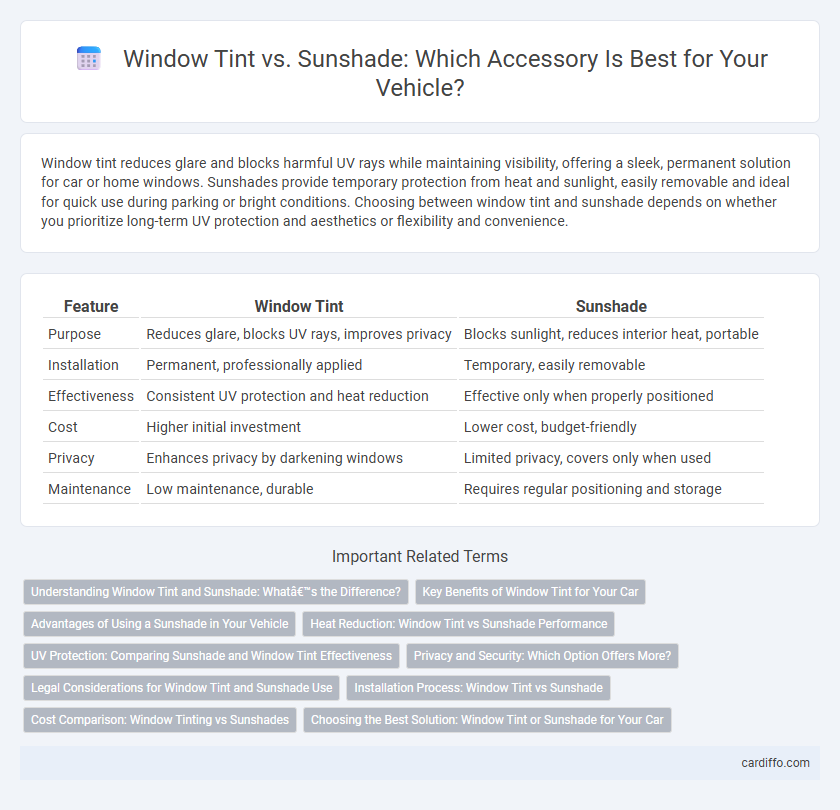Window tint reduces glare and blocks harmful UV rays while maintaining visibility, offering a sleek, permanent solution for car or home windows. Sunshades provide temporary protection from heat and sunlight, easily removable and ideal for quick use during parking or bright conditions. Choosing between window tint and sunshade depends on whether you prioritize long-term UV protection and aesthetics or flexibility and convenience.
Table of Comparison
| Feature | Window Tint | Sunshade |
|---|---|---|
| Purpose | Reduces glare, blocks UV rays, improves privacy | Blocks sunlight, reduces interior heat, portable |
| Installation | Permanent, professionally applied | Temporary, easily removable |
| Effectiveness | Consistent UV protection and heat reduction | Effective only when properly positioned |
| Cost | Higher initial investment | Lower cost, budget-friendly |
| Privacy | Enhances privacy by darkening windows | Limited privacy, covers only when used |
| Maintenance | Low maintenance, durable | Requires regular positioning and storage |
Understanding Window Tint and Sunshade: What’s the Difference?
Window tint involves applying a thin film to car windows to reduce glare, block UV rays, and enhance privacy, while sunshades are removable accessories designed to physically block sunlight and heat when parked. Tinting provides a permanent solution that improves energy efficiency and protects interior materials from fading, whereas sunshades offer flexible, temporary coverage for direct sun exposure. Choosing between window tint and sunshade depends on the desired level of protection, convenience, and local regulations regarding tint darkness.
Key Benefits of Window Tint for Your Car
Window tint enhances your car's interior by blocking up to 99% of harmful UV rays, reducing glare and heat buildup for improved comfort and protection. It also increases privacy and security by obscuring the view into the vehicle, deterring theft and safeguarding belongings. Furthermore, window tint helps preserve the car's upholstery and dashboard from fading and cracking, extending the lifespan of your interior materials.
Advantages of Using a Sunshade in Your Vehicle
Using a sunshade in your vehicle significantly reduces interior heat buildup by blocking direct sunlight, which enhances passenger comfort during hot weather. Sunshades also protect the dashboard and upholstery from harmful UV rays, preventing fading and cracking, thereby extending the lifespan of your car's interior. Unlike window tints, sunshades are easy to install and remove, offering a flexible and cost-effective solution for sun protection without permanent modifications.
Heat Reduction: Window Tint vs Sunshade Performance
Window tint offers superior heat reduction by blocking up to 60% of solar energy through its advanced dye and metal layers, effectively lowering interior temperatures and protecting against UV rays. Sunshades primarily reduce heat by reflecting sunlight away from the vehicle's surface but are less effective during driving as they only block direct sunlight through the windshield. For continuous heat control, window tint provides consistent thermal insulation even while driving, whereas sunshades are limited to parked vehicle protection.
UV Protection: Comparing Sunshade and Window Tint Effectiveness
Window tint blocks up to 99% of harmful UV rays, providing superior protection compared to most sunshades, which typically block only direct sunlight but allow some UV exposure. High-quality window films are designed to absorb and reflect UV radiation, reducing skin damage and interior fading more effectively than sunshades. While sunshades offer convenience and partial UV defense, window tint remains the optimal choice for comprehensive UV protection in automotive and residential settings.
Privacy and Security: Which Option Offers More?
Window tint enhances privacy by reducing visibility into the vehicle, making it harder for outsiders to see inside and helping protect personal belongings from theft. Sunshades provide temporary coverage and block sunlight but offer limited security since they are easily removed or overturned. For maximum privacy and security, window tinting is the more effective, long-term solution.
Legal Considerations for Window Tint and Sunshade Use
Legal considerations for window tint primarily involve compliance with state-specific regulations on tint darkness and reflectivity to ensure driver visibility and safety. Sunshades, although generally less regulated, must not obstruct driver view or interfere with vehicle sensors to avoid legal issues. Both accessories require adherence to transportation laws to prevent fines and ensure safe driving conditions.
Installation Process: Window Tint vs Sunshade
Window tint installation involves applying a thin, adhesive film directly onto the interior surface of the car windows, requiring precise cutting and smoothing to avoid bubbles and creases. Sunshades are simpler to install, often designed as foldable or retractable screens that attach via suction cups or fit directly into the window frame without adhesives. While window tint offers a permanent solution demanding professional or DIY skills for clean application, sunshades provide a temporary, easy-to-install accessory suitable for quick sun protection.
Cost Comparison: Window Tinting vs Sunshades
Window tinting typically involves an upfront cost ranging from $150 to $400, depending on vehicle size and film quality, offering long-term benefits such as UV protection and heat reduction. Sunshades, priced between $10 and $50, provide a budget-friendly and portable solution but require frequent replacement and offer less comprehensive sun protection. Considering durability and effectiveness, window tinting presents a cost-efficient investment over time compared to the recurring expenses of sunshades.
Choosing the Best Solution: Window Tint or Sunshade for Your Car
Choosing the best solution between window tint and sunshade depends on your specific needs for UV protection, heat reduction, and privacy. Window tint offers a permanent, sleek look with improved glare reduction and enhanced security, while sunshades provide a flexible, cost-effective option for blocking sunlight when parked. Consider factors such as durability, installation, and legal restrictions on tint darkness to make an informed decision for your car's comfort and protection.
Window Tint vs Sunshade Infographic

 cardiffo.com
cardiffo.com